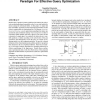Free Online Productivity Tools
i2Speak
i2Symbol
i2OCR
iTex2Img
iWeb2Print
iWeb2Shot
i2Type
iPdf2Split
iPdf2Merge
i2Bopomofo
i2Arabic
i2Style
i2Image
i2PDF
iLatex2Rtf
Sci2ools
134
click to vote
CIKM
2005
Springer
2005
Springer
Selectivity-based partitioning: a divide-and-union paradigm for effective query optimization
Modern query optimizers select an efficient join ordering for a physical execution plan based essentially on the average join selectivity factors among the referenced tables. In this paper, we argue that this “monolithic” approach can miss important opportunities for the effective optimization of relational queries. We propose selectivitybased partitioning, a novel optimization paradigm that takes into account the join correlations among relation fragments in order to essentially enable multiple (and more effective) join orders for the evaluation of a single query. In a nutshell, the basic idea is to carefully partition a relation according to the selectivities of the join operations, and subsequently rewrite the query as a union of constituent queries over the computed partitions. We provide a formal definition of the related optimization problem and derive properties that characterize the set of optimal solutions. Based on our analysis, we develop a heuristic algorithm for com...
| Added | 26 Jun 2010 |
| Updated | 26 Jun 2010 |
| Type | Conference |
| Year | 2005 |
| Where | CIKM |
| Authors | Neoklis Polyzotis |
Comments (0)

